
Are you worried about the potential for “hot button” issues to create uncomfortable situations in your classroom?
Careful reflection in the days and weeks following a difficult classroom discussion is essential to improve teaching and learning. The purpose of this document is to provide instructors with concrete strategies for ways in which you can synthesize what happened and plan to facilitate future difficult dialogues in your classroom.
Download Part 3 PDF
Reflecting
Suggestions for Potential Self-Assessment Strategies
Evaluate Your Response
- Recognize that difficult dialogues are a normal part of teaching
- Practice self-compassion by being kind to yourself and view this as an opportunity for growth
- Think about how you reacted. Were you calm and constructive, or did you respond emotionally? Consider what worked and what didn’t.
Managing Triggers
- Identify what specific statements or behaviors triggered strong emotions. This awareness helps in preparing for similar situations in the future.
- What specifically triggered discomfort? Was it a particular student’s comment, a disagreement, or a topic? Understanding these triggers can help you prepare for future dialogues.
Journaling
- Journaling can be helpful. Write down your thoughts and feelings about the interaction. What was said? How did it make you feel? What were the students’ perspectives?

Analyze Classroom Dynamics
Student Engagement
- Were students actively participating, or did certain voices dominate the conversation?
- Did you encourage a diversity of perspectives?
- Did any students appear particularly uncomfortable?
- Think about how to better support a range of voices in the future.
- Consider if there were any power dynamics at play. Were certain students using their position (e.g., privilege or seniority) to dominate the conversation? How did you address or manage that?
- Reflect on whether students felt safe expressing their views. Did any students appear uncomfortable or hesitant to speak? Consider how you can foster an inclusive environment where discussions can take place without fear of judgment.
Alignment with Goals
- Reflect on whether the discussion advanced the intended learning objectives. If not, think about how you could realign future discussions with the course’s goals.
- Did the discussion prompt critical thinking, reflection, or deeper engagement with the subject? Even if the conversation was difficult, did it foster intellectual or emotional growth in the students?
Seek Student Feedback
- Ask students for feedback on how the discussion went and how they felt about it.
- Anonymous surveys or one-on-one check-ins can provide valuable insights into how students perceived the conversation.
Additional Resources
The following resources were consulted in the construction of this guide and can be referenced for deeper exploration.
- UT-Knoxville – Inclusive Teaching Toolbox – The “after class” portion supports the information included in this document.
- UT-Knoxville – Top 5 Tips for Facilitating Difficult Dialogues About Racism and Anti-Semitism
- University of Virginia – Six Ways to Encourage Difficult Dialogues
- University of Florida – Handbook for Facilitating Difficult Conversations in the Classroom
- University of Wisconsin-Milwaukee – Faculty Guide to Navigating Difficult Dialogues
- University of Connecticut – Difficult Dialogues
- Tufts – How Can I Manage Difficult Dialogues?
- Penn State Harrisburg – Inviting Difficult Dialogue
- Vanderbilt University – Difficult Dialogues
- Brown University – Facilitating Controversial Discussions
- Harvard University – Key Moves
- Carnegie Mellon University – Handle Difficult Moments with Respect & Sensitivity
- University of Delaware – Difficult Dialogues
- University of Michigan – Guidelines for Discussing Difficult or High-Stakes Topics
